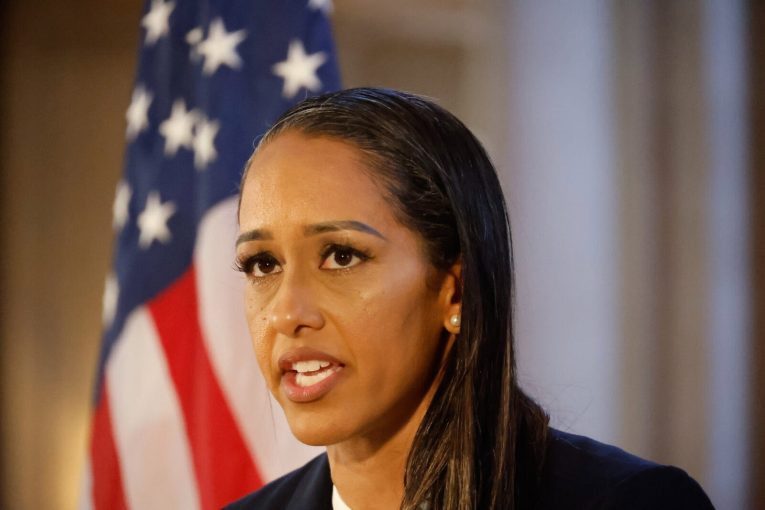

By David M. Greenwald
Executive Editor
San Francisco, CA – In her first actions as DA, Brooke Jenkins fired 16 people in her department—all of them former Chesa Boudin hires. Of her first four hires, she signaled a clear change of direction, bringing in several people who clearly come down on a more traditional approach to prosecution rather than a reform-minded approach.
On Thursday, she named some additional hires, issuing a statement, “San Francisco can have both important criminal justice reforms and public safety.”
While most reformers believe that to be the case, the problem has been that—so far—the emphasis of the Jenkins administration has been long on the latter and very short on the former.
“I understand the need for reforms personally,” Jenkins said in a statement. “As a Black and Latina woman, I have had family on both sides of the courtroom, and know that crime and violence disproportionately impacts communities and people of color. I want to ensure that my office and leadership team is reflective and representative of San Francisco’s diverse communities and views.”
But talk is cheap. Bringing in Ana Gonzalez, Nancy Tung and Tiffany Sutton does not inspire confidence that criminal justice reform is high on her list of priorities.
One of the key hires announced on Thursday was Darby Williams, who is expected to manage prosecutions of police officers.
According to the release, Williams began her career as a Los Angeles County public defender. She eventually served as an Assistant District Attorney in the Independent Investigations Bureau in San Francisco and later as Deputy Attorney General III with the California Department of Justice.
One of the first tasks Williams will have is to re-examine the 2016 police killing of Luis Góngora Pat in the Mission District. Last month, it was reported that Boudin’s office was re-examining that case in which Williams was one of the investigating attorneys and Gascón declined to file charges against the two officers who fired the shots.
The Chronicle reports that Rebecca Young, one of the Assistant DAs fired last week, and herself a former public defender, called Williams’ placement like “putting the fox in charge of the hen house.” Young criticized Williams’ time as a prosecutor, saying that there’s an “inherent bias in favor of an officer’s story.”
I firmly believe that we can have both public safety and criminal justice reform—but I believe that Jenkins, at least so far, is not going about that in the right way.
I just interviewed Akhi Johnson of the Vera Institute of Justice for an upcoming Podcast. One of the points he made, which has been made by so many other reformers, is if incarceration were the key to public safety, “the US would be the safest country in the world.”
Instead, our carceral system is a very expensive and fundamental failure. It costs in excess of $50,000 to house someone incarcerated in the San Francisco Jail for one year and it costs over $100,000 to incarcerate someone at CDCR. To put that into perspective, for that cost, we could pay for a first-rate college education. Instead, we are paying huge amounts of money to effectively lock human beings in a cage.
On top of that, San Francisco Public Defender Mano Raju recently stated that 20 percent of the San Francisco jail population has been held in custody for a period longer than the constitutionally mandated right to trial. Mission Local recently reported that the DA’s office has more than 5500 outstanding cases that are nearly two years old.
But it’s a systemic failure. Incarceration might temporarily protect the public at large from the small percentage of dangerous people and larger percentage of people who find themselves struggling with drug addiction or mental illness or trapped in poverty—but incarceration makes things worse often.
The stats speak volumes—fully 95 percent of those incarcerated will be released at some point in time. The number of actual life sentences are small. But our recidivism rate is still between 60 and 70 percent. That means that the system does little to stop the cycle of poverty and incarceration and instead exacerbates it.
We lack the resources for mental health care and substance abuse treatment, in part because we spend so much on simply locking people away.
The system lacks the education and job training needed to get people back on their feet; once released, many are subjected to crippling supervision, inability to receive certain kinds of government assistance including housing, and restrictions—formal and informal—on the type of jobs people can hold.
As I said yesterday, if we wanted to intentionally design a system to made it likely that someone will fall back into patterns of crime, we could hardly do better than we have with the current system.
Finally, we should start talking about the victim-to-prison pipeline as well. A huge amount of people who end up in the system started out as victims. They were victims of things like sexual abuse, assault, and domestic violence.
Untreated trauma is a huge part of the problem. But also, one of the points Akhi Johnson made is that if the system fails to protect and deal with these problems, the victims no longer even want to come forward to access the few services they get. That untreated trauma then circulates back—except, next time, the victim is on the other end of the cycle.
Chesa Boudin said many times that the current system makes us less safe. Ironically, while the voters did not give him time for his policies to start taking effect and working, Brooke Jenkins has repeatedly said that she can’t fix the problems overnight either.
In end, she’s right about one thing—we can have criminal justice reform and public safety. The problem, at least at this point, is that we have not seen nearly enough reform to fix the true problems of the system.

